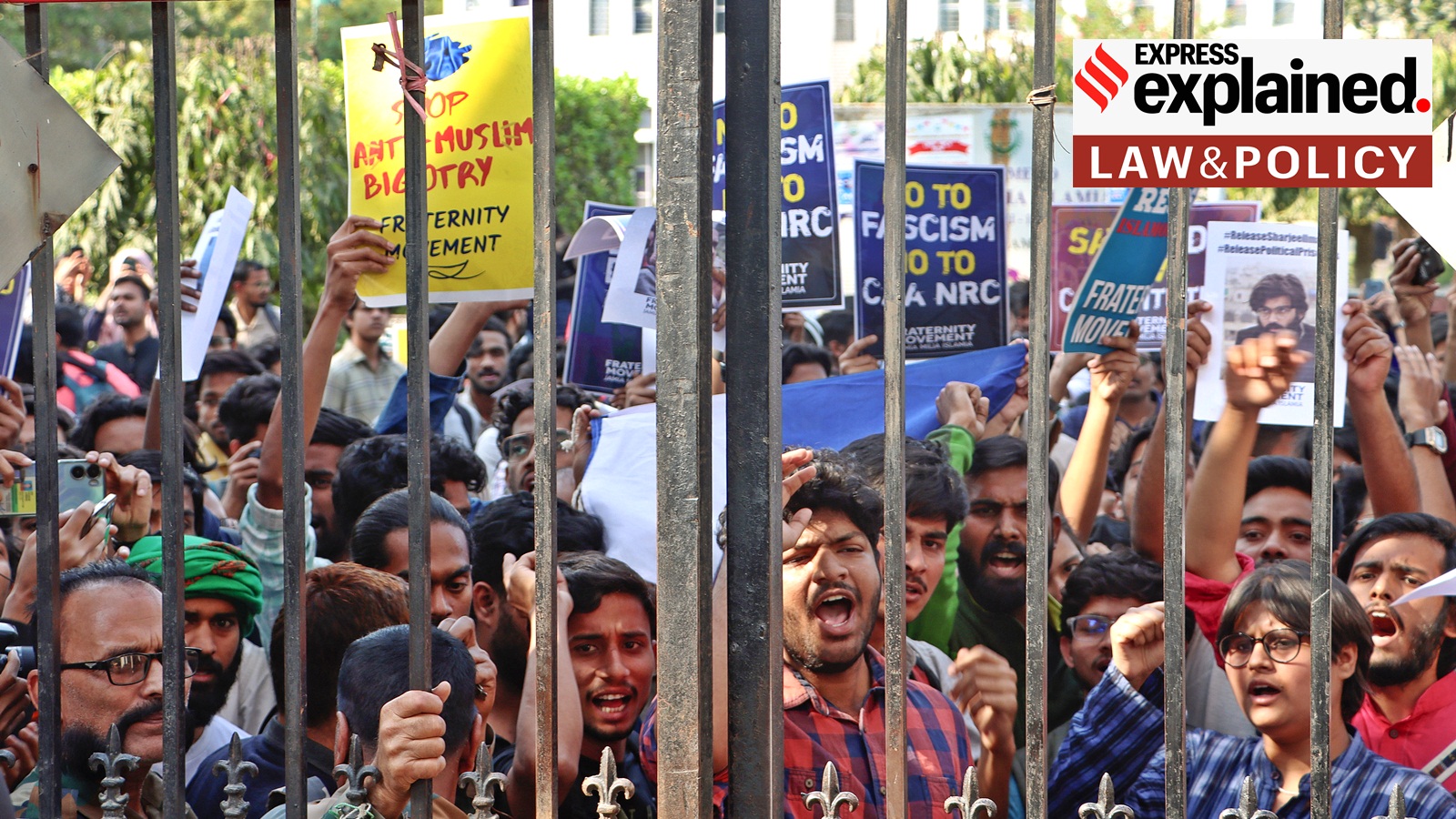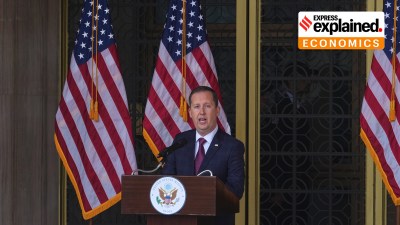The CAA Rules, unpacked
What do the Rules notified by the government for the implementation of the new citizenship law say? What documents must applicants provide, and who will be in charge of processing their applications?
 Students of Jamia Millia Islamia university stage a protest after the central government notified the rules for implementation of the Citizenship (Amendment) Act, 2019, in New Delhi, Tuesday, March 12, 2024. (PTI Photo)
Students of Jamia Millia Islamia university stage a protest after the central government notified the rules for implementation of the Citizenship (Amendment) Act, 2019, in New Delhi, Tuesday, March 12, 2024. (PTI Photo)The Centre on Monday (March 11) notified Rules for The Citizenship Amendment Act (CAA), paving the way for the implementation of the controversial law more than four years after it was passed by Parliament in December 2019.
The CAA will benefit thousands of Hindu, Sikh, Buddhist, Jain, Parsi, or Christian migrants from Pakistan, Bangladesh, and Afghanistan who entered India before December 31, 2014, and seek citizenship of India. This group of people has been living in India illegally or on long-term visas (LTV).
What information must the intended beneficiaries of the CAA provide?
The CAA aims to give citizenship to the target group of migrants even if they do not have valid travel documents as mandated in The Citizenship Act, 1955. The CAA presumes that members of these communities who entered India faced religious persecution in these countries. The law has also cut the period of citizenship by naturalisation from 11 years to five.
Under the CAA Rules, immigrants from these countries are only supposed to prove the country of their origin, their religion, the date of their entry into India, and the knowledge of an Indian language to apply for Indian citizenship.
What proof is required to establish the country of origin under CAA?
The rules have been relaxed very significantly. The earlier essential requirement of a valid passport issued by Pakistan, Bangladesh, or Afghanistan, along with a copy of a valid Residential Permit of India, has been virtually done away with.
According to the CAA Rules, a birth or educational institution certificate, “Identity Document of any kind”, “Any License or Certificate”, “Land or tenancy records”, or “Any other document” issued by these countries, which proves the applicant was their citizen, would serve as proof of citizenship of these countries.
Any document that shows that “either of the parents or grandparents or great grandparents of the applicant is or had been a citizen of one of the three countries” is also acceptable.
Importantly, these documents will be admissible even beyond their validity period. Sources said these documents can also be used to establish the religion of the applicant.
The requirement of a certificate from an educational institution, certifying that the applicant knows one of the languages mentioned in the Eighth Schedule of the Constitution, has also been done away with. Now, merely a declaration to that effect, and the ability to speak the language, will be enough.
And how will the date of entry into India be established?
The Rules list 20 documents, any of which would be admissible as proof of date of entry into India.
These include a valid visa or residential permit issued by the Foreigners’ Regional Registration Office (FRRO); slip issued by census enumerators in India; a driving licence, Aadhaar, ration card, or any letter issued by the government or a court; an Indian birth certificate; land or tenancy records; registered rent agreement; PAN card issuance document, or a document issued by the central or a state government, PSU, or bank; certificate issued by an elected member of any rural or urban body or officer thereof, or a revenue officer; a post office account; an insurance policy; utility bills; court or tribunal records; EPF documents; school leaving certificate or academic certificate; a municipality trade license; or a marriage certificate.
Earlier, a visa along with certain other documents was an essential requirement.
Who will be in charge of processing the applications for citizenship?
Opposition-ruled states including Kerala and West Bengal have said they will not implement the CAA. Under the Rules, however, the Centre has tweaked the process of grant of citizenship to non-Muslim migrants from the three countries in such a way that states will have little say in the matter.
Thus, while citizenship applications were earlier made to the district collector — who is under the administrative control of the state government — the new Rules provide for an Empowered Committee and a District Level Committee (DLC), to be instituted by the Centre, to receive and process the applications, which are to be submitted electronically.
Applications will be made to the DLC, and the final decision will be taken by the Empowered Committee.
The Empowered Committee will be headed by a Director (Census Operations), and will have as its members an officer of the Subsidiary Intelligence Bureau (under the Ministry of Home Affairs) of the rank of deputy secretary or above, the FRRO, the State Informatics Officer of the National Informatics Centre (under the Ministry of Electronics & Information Technology), and the Postmaster General (under the Union Ministry of Communications) of the state. A representative each from the state home department and the Railways will be invitees to the Committee.
The DLC shall consist of the District Informatics Officer or District Informatics Assistant of the concerned district, and a nominee of the central government. The two invitees to the committee will be a representative of the district collector’s office not below the rank of Naib Tehsildar or equivalent, and the jurisdictional station master of the Railways (subject to availability).
Is this the first time that the government has moved to address the plight of these refugees?
No. The first steps in this direction were taken back in 2002, when the state of Rajasthan requested then Deputy Prime Minister L K Advani to help resolve the difficulties faced by Pakistani Hindus trying to procure Indian visas and citizenship.
As a result, in February 2004, the government of Prime Minister Atal Bihari Vajpayee amended The Citizenship Rules to give district magistrates of certain border districts in Rajasthan and Gujarat the power to grant LTVs and citizenship to such migrants.
Subsequently, in June 2010, when Manmohan Singh was Prime Minister, the Ministry of Home Affairs asked states and Union Territories to consider cases for extension of LTVs of certain categories of Pakistani nationals without insisting on the validity of passports. The notification put the cut-off date at December 31, 2009.
Hindus and Sikhs from Pakistan were eligible under this policy, apart from Pakistani women who were married to Indian nationals and were staying in India; widowed or divorced Indian women who were married to Pakistanis; and “cases involving extreme compassion”.
Grant of LTVs was also considered in the case of originally-Indian Muslim men who went to Pakistan after Partition leaving behind family in India, and returned on valid Pakistani passports and settled in Kerala.
In December 2014, the first Narendra Modi government issued a notification allowing grant of citizenship to Hindu, Sikh, Christian and Buddhist migrants from Pakistan. Jains and Parsis were not included in this relaxation.
In 2015 and 2016, the government amended The Passport (Entry into India) Rules and The Foreigners Order exempting Hindus, Sikhs, Buddhists, Jains, Parsis, and Christians from Pakistan, Afghanistan, and Bangladesh from the process of law in case they entered India without a passport or visa.
Finally, in 2018, a year before Parliament passed the CAA, the government issued a notification that made these communities eligible for LTVs if they sought Indian citizenship. A range of benefits were extended to them — they could get a private job, start a business, admit their children to school, move freely within the state, open a bank account, buy a house, and get a driving licence, PAN, and Aadhaar.
- 01
- 02
- 03
- 04
- 05






































